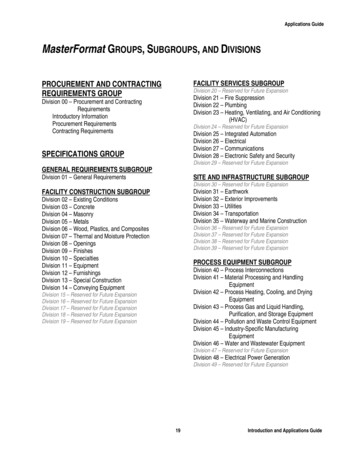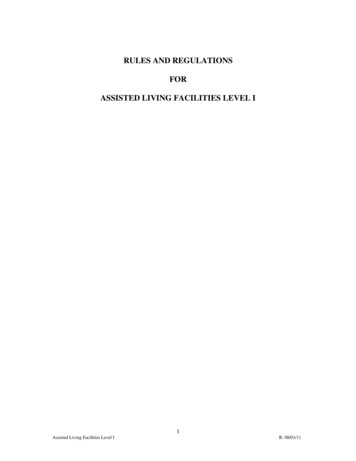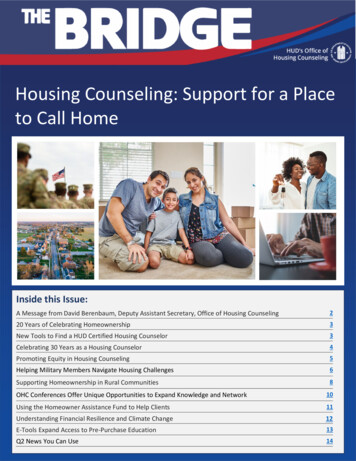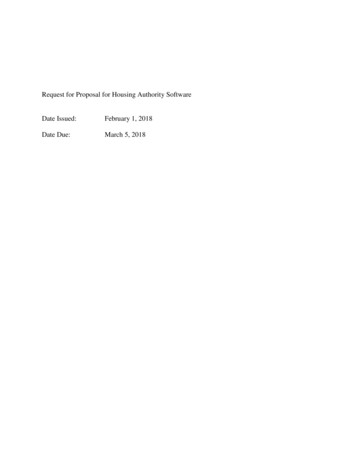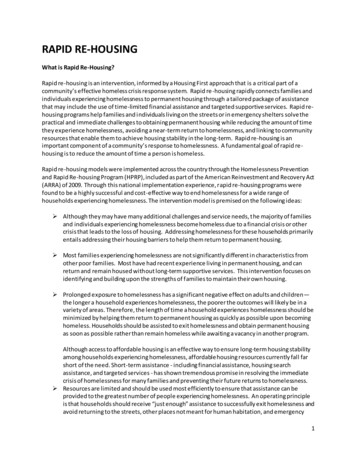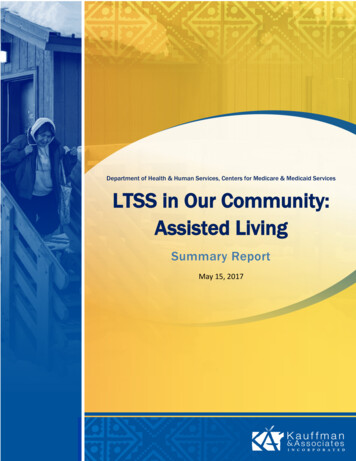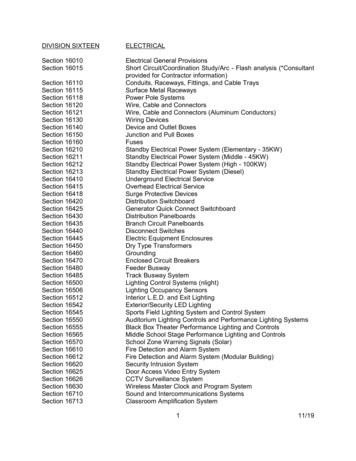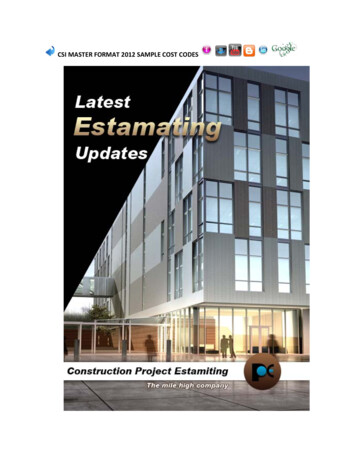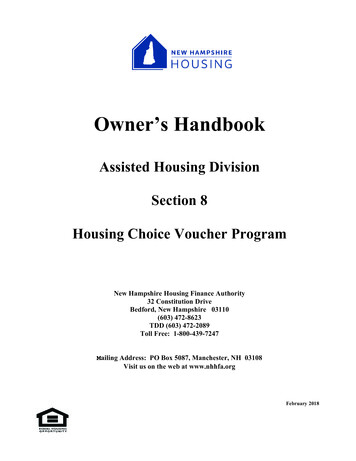
Transcription
Owner’s HandbookAssisted Housing DivisionSection 8Housing Choice Voucher ProgramNew Hampshire Housing Finance Authority32 Constitution DriveBedford, New Hampshire 03110(603) 472-8623TDD (603) 472-2089Toll Free: 1-800-439-7247Mailing Address: PO Box 5087, Manchester, NH 03108Visit us on the web at www.nhhfa.orgFebruary 2018
Table of ContentsI.Program OverviewIntroduction to Housing Choice Voucher (HCV)Limited English ProficiencyFair Housing LawsThe Violence Against Women Act (VAWA)II.The RolesThe Role of HUDThe Role of New Hampshire HousingThe Role of the FamilyThe Role of the OwnerIII.4556The StepsSteps For Renting to a Voucher HolderScreening TenantsInspectionsInspection CriteriaHousing Quality Standards (HQS)Disapproval of a UnitFamily Violations of HQSLead Based PaintIV.333467789111212RentRentSection 8 Housing Assistance Payment (HAP) ContractNew Hampshire Housing’s Role in Ending TenancyTenant Termination from HCV ProgramProgram FraudSubmitting a Rental Property to our website131414151516Appendix Index A - EPA-HUD Fact Sheet – Lead Based Paint Poisoning B – Housing Assistance Payments Contract and Tenancy Addendum C - Violence Against Women’s Act (VAWA) Owner’s Notice2
I.Program OverviewIntroduction to the Housing Choice Voucher Rental Assistance ProgramNew Hampshire Housing (NHHFA) is pleased to make this Owner Handbook available as a guide toHUD requirements and NHHFA’s policies and procedures. NHHFA provides Section 8 Housing Choice Voucher (HCV) rental subsidies under contractwith HUD for over 3,500 families throughout the State of New Hampshire. NHHFA is responsible for determining applicant and tenant income eligibility, inspecting unitsto ensure HUD’s Housing Quality Standards are met, and negotiating fair and reasonable rentsthat reflect the local housing and rental market. NHHFA promotes regional and community housing opportunities, neighborhood stability, andeconomic and self-reliance for families.Please call our office with any concerns, questions or suggestions.Limited English Proficiency (LEP)It is New Hampshire Housing’s policy to take reasonable steps to provide meaningful access to ourprograms and activities for persons with Limited English Proficiency (LEP). Our policy ensures thatstaff will communicate effectively with LEP individuals, and that LEP individuals will have access toimportant programs and information. New Hampshire Housing is committed to complying withfederal requirements and provides free meaningful access to our programs and activities for LEPclients. If a client asks for language assistance, or if staff identifies a client who needs assistance,New Hampshire Housing will make reasonable efforts to provide free language assistance.Fair Housing LawsFair Housing Laws exist to ensure all tenants are treated fairly and equally in their search for housing,whether looking to own or rent. New Hampshire Housing is dedicated to these Fair Housing laws andto making sure that the owners and tenants are aware of their rights and responsibilities under them.An owner cannot refuse to rent to anyone solely because of their race, color, religion, sex, disability,familial status, national origin, age, marital status or sexual orientation.Discrimination may include: Setting different terms or conditions for different people. Advertising in a discriminatory way. For example: No children. Denying a unit is available when it actually is available.For more information, please see: HUD Notice 2010-26https://www.hud.gov/sites/documents/DOC 8993.PDFOffice of Fair Housing and Equal Opportunity: www.fheo.gov.3
The Violence Against Women’s Act (VAWA)The Violence Against Women Act (VAWA) and Justice Department Reauthorization Act of 2013protects tenants and family members of tenants who are victims of domestic violence, datingviolence, or stalking from being evicted or terminated from housing assistance based on acts ofviolence against them. These provisions apply both to public housing agencies administeringpublic housing and Section 8 programs and to owners renting to families under Section 8 RentalAssistance Programs.The law provides in part that criminal activity directly relating to domestic violence, dating violence,sexual assault or stalking, engaged in by a member of a tenant's household or any guest or other personunder the tenant's control, shall not be cause for termination of assistance, tenancy, or occupancy rightsif the tenant or an immediate member of the tenant's family is the victim or threatened victim of thatabuse.The law also provides that any incident of actual or threatened domestic violence, dating violence,or stalking will not be construed as serious or repeated violations of the lease by the victim orthreatened victim of that violence and will not be "good cause" for termination of the assistance,tenancy, or occupancy rights of a victim of such violence.For additional information visit our website: www.nhhfa.org.VAWA Owner’s Notice http://www.nhhfa.org/assets/pdf/VAWA OwnersNotice.pdfHUD Notice PIH 2017-08: VAWA Reauthorization Act of doc?id PIH-2017-08VAWRA2013.pdfII.The RolesThe Role of HUDThe US Department of Housing and Urban Development (HUD) provides rent subsidies to eligible,low-income individuals and families in the form of Section 8 Housing Choice Vouchers. HUDallocates the subsidies to New Hampshire Housing who administers the program on behalf of HUDthroughout the State of New Hampshire.The subsidy in the Housing Choice Voucher Program is determined by a formula using the lower ofthe gross rent (rent plus the New Hampshire Housing utility allowance), or the payment standard and30% of the family’s income. We are required to figure out whether the family’s portion of the rent ismore than 40% of their monthly adjusted income before approving a unit.4
The Role of New Hampshire HousingNew Hampshire Housing has four areas of responsibility:1. To determine family eligibility for the Housing Choice Voucher (HCV) Program.2. To inspect units to ensure compliance with HUD Housing Quality Standards (HQS).3. To review leases between participating property owners and tenants.4. To execute contracts with and make Housing Assistance Payments to property owners.New Hampshire Housing does not act as the property owner or manager. It is the responsibilityof the property owner to screen and select the tenant and to enforce the terms of the lease.The Role of the FamilyThe family must meet all program obligations in order to maintain participation in the HCV Program,as outlined in the Statement of Family Responsibility.Examples of family obligations include: Providing New Hampshire Housing with income information and family composition as neededto verify program eligibility and to calculate rent subsidies. Allowing New Hampshire Housing to conduct annual inspections of the unit. Not engaging in drug-related or violent criminal activity.Failure to comply with these program responsibilities may result in a family’s termination fromthe HCV program.Tenants also have obligations to the property owner, which are outlined in the lease. Examples oftenant obligations are: Paying the rent in full on a timely basis each month. Maintaining the unit in good condition.Failure to comply with the lease obligations may result in termination of the lease and eviction ofthe tenant from the unit through court action. The property owner, not New Hampshire Housing,has the authority to terminate a lease or institute eviction proceedings. If the family violates theirobligations, New Hampshire Housing has the right to terminate housing assistance payments madeto the owner on behalf of the family. Payment continues throughout the eviction process unlesssuspended for another reason but no payment can be made after the tenant moves out.5
The Role of the OwnerAs a participant in the Section 8 Rental Assistance Program, the property owner has the followingresponsibilities: Screen, select and enter into a lease with the tenant. Honor and enforce the terms of the lease and contract. Maintain the unit in a safe, decent and sanitary condition. Conduct normal property owner functions (rent collection, property maintenance) in accordancewith the terms of the lease and local and state law.III.Steps for Renting To A Voucher Holder Ask the potential renter for their New Hampshire Housing Rental Assistance Manager’s nameand phone number. Contact the Rental Assistance Manager for an explanation of the program and to answer anyquestions about the subsidy program to guide you through the process. Include a discussion ofrent and utilities for the unit. Decide whether you wish to rent to the New Hampshire Housing voucher holder.1. Screen the client.2. Follow your normal process when deciding to rent to an individual or family, which mayinclude running a credit check or calling for references. Complete the following forms:1. Request for Tenancy TenancyApproval.pdf2. W-9 form https://www.irs.gov/pub/irs-pdf/fw9.pdf?portlet 33. Electronic Fund Enrollment form .pdf Set up an inspection with the New Hampshire Housing Rental Assistance Inspector. Complete any needed repairs. When repairs are completed and verified and a move-in date hasbeen agreed upon, New Hampshire Housing will prepare paperwork and a contract package willbe mailed to you. Request that the tenant sign your lease, pay a security deposit and move in. The initial term ofthe lease must be for one year. The lease can be month-to-month once the initial one-year termhas expired. Electronic fund transfers for New Hampshire Housing subsidy portion will be wired directly toyour financial institution, on the first business day of the month.6
Note: The unit must pass inspection and the lease (signed by the owner and family) and the contract(signed by the owner) must be returned to New Hampshire Housing via fax or mail before paymentwill be made. Faxing paperwork will result in the fastest turnaround time.Screening TenantsSelection of a family for participation in our program does not mean that New Hampshire Housinghas screened the family's behavior or suitability for tenancy. Such screening is the owner’sresponsibility. To follow the Fair Housing act, use the same process you follow for unassisted tenants.You might consider such things as: Payment of rent and utility bills. Caring for a unit and premises. Respecting the rights of others to the peaceful enjoyment of their housing. Drug-related criminal activity or other criminal activity that is a threat to the life, safety orproperty of others. Compliance with other essential conditions of tenancy.Upon request, New Hampshire Housing can release the family's current address, their currentlandlord's name and address, and the name and address of prior owners. New Hampshire Housingpolicy, under HUD guidelines, does not allow us to supply any further information to prospectiveowners.InspectionsPrior to the owner receiving a subsidy payment, the unit must be inspected to ensure compliancewith HUD Housing Quality Standards (HQS). These standards were created to ensure all housingsubsidized by New Hampshire Housing meets acceptable criteria for safety, cleanliness and comfort.It is preferable that the unit be vacant at the time of inspection. The purpose of having the unit vacantis to allow the inspector to view the unit in move-in condition.All utilities should be in full working condition even if the tenant will ultimately be responsible forthe payments of these utilities. If the utilities are not operable at the time of the inspection, aninconclusive rating will be given to that portion of the inspection until the inspector can verify theutility requirement. The inspector must be able to access all common areas and the basement of thebuilding.New Hampshire Housing conducts inspections every other year. The family must allow the NewHampshire Housing inspector to inspect at a reasonable time with reasonable notice. Two failed7
inspection attempts will result in termination of assistance. The process typically begins 90-120 daysprior to the inspection date. A person 18 years of age and older must be present for the inspection.Inspection Criteria:The inspector will be looking at many criteria during the inspection. Key items are: Sanitary facilities: The condition and cleanliness of the bathroom facilities. The inspector willmake sure that all equipment is in working order and does not present any safety/health concerns forthe tenant. Food preparation and refuse disposal: The unit must have suitable space and equipment to store, prepare and serve food in a sanitarymanner. The unit must have an oven, stove or range, and a refrigerator of appropriate size for the family.All of these appliances must be in proper working condition. These appliances may be suppliedby either the landlord or the tenant. If the tenant is supplying the stove, he/she may substitute amicrowave oven. If the owner is supplying the stove, a microwave may be substituted if thetenant agrees and if the owner supplies microwave ovens instead of stoves to both subsidizedand unsubsidized tenants. There must be a kitchen sink in proper working condition Space and security: There must be adequate space for the size of the family. The general rule istwo persons per living/sleeping area. Security needs must be provided for the family includingthe requirement that first floor windows must lock or must be combination storm windows. Thermal Environment: All units must provide adequate heating and ventilation for the tenant.A heating system service ticket on the heating unit itself also will help the inspector to determineif the unit is maintained and serviced on a regular basis. Illumination and Electrical: Each room must have adequate natural or artificial illumination topermit normal indoor activities and to support the health and safety of occupants. There mustbe at least one window in each living/sleeping room. All electrical systems in the unit must bein proper operating condition and not present any safety or health hazards. Electrical outlets mustbe properly grounded. Structural soundness: Structural soundness of the interior of the unit and the exterior of thebuilding are taken into consideration during the inspection. The interior and exterior walls or floorscannot have serious defects such as bulging, leaning, large holes, loose surface materials or otherserious damage. Safety: Electrically-powered/hard wired smoke detectors are required per New Hampshire StateFire Code. Smoke detectors are best placed between the bedroom areas and the rest of the unit.In addition to smoke detectors outside the sleeping areas, the National Fire Protection Association8
also requires the installation of a smoke detector on each additional story of the family unit,including the basement.Carbon Monoxide (CO) Detectors: are now required under New Hampshire State Law (RSA153:10a). The CO Detectors must have battery back-up and be electrically powered, either by beinghard wired or plug-in as noted in the bulletin from the State Fire fety/bulletins/documents/CObulletinaddendum.pdfNew Hampshire Housing has adopted the National Fire Protection Association standard for smokedetectors, carbon monoxide detectors and overall fire protection and safety (Chapter 153 StateBoard of Fire Control, Information Bulletin 2009-007 Addendum Office of the State of NewHampshire Fire Marshall). B0317.htmlBuildings that do not have attached garages or any fuel-fired or solid fueled appliances or devicesare exempt from the requirements. The property owner is responsible to know the law and tomaintain both smoke detectors and CO detector systems in good working order.The above items are a sampling of the criteria used to determine the acceptability of a unit for assistedhousing subsidy. While there are additional requirements to be met, the items above are meant to givea general idea to the property owner if his/her unit would be a candidate for the HCV Program. Theowner and tenant may save time and unnecessary delays in paperwork by being aware of these itemsprior to inspection.Housing Quality Standards (HQS)Please use this checklist to help determine if the unit will pass basic inspection guidelines. A NewHampshire Housing representative will inspect the unit to see if it will qualify for the program.Yes NoThe Building ExteriorAre foundation, stairs, rails, gutters, and porch sound and free from hazards anddeterioration?Is there a handrail if the unit has four or more steps?Are the chimney and other brickwork free of loose bricks and mortar?If you have a child under age 6, is the paint chipping, peeling or cracking?Living RoomAre there two working electrical outlets or one outlet and one light fixture?Can first floor windows be locked or are there combination windows?Are the windows and frames in good condition?Are walls, ceilings and floors in good condition?If you have a child under age 6, is the paint peeling, chipping or cracking?KitchenIf appliances are provided, are they working properly?Is the plumbing free from leaks and working properly?Are there two working electrical outlets or one outlet and one light fixture?9
Can all first floor windows be locked and are they in good condition?If you have a child under the age of 6, is the paint peeling, chipping or cracking?Is there adequate space for storage and food preparation?BathroomAre the tub, sink, shower and toilet in good condition and working properly?Is there an air vent or an openable window with a lock?Are floors, ceilings and walls clean and in good condition?Is there at least one light fixture?BedroomsDoes each bedroom have a window in good condition?Does the bedroom window lock or have combination windows if the bedroom is on the111111first floor?Are there two working electrical outlets or one outlet and one light fixture ineach bedroom?Are floors, ceilings and walls clean and in good condition?If you have a child under age 6, is the paint peeling, chipping or cracking?Other Rooms and AreasDo the furnace and water heater work?Are the furnace and water heater in good condition?Does the unit contain working, hard-wired smoke detectors? (Hard-wired smokedetectors are required on each level, including the basement and common halls).If a hearing impaired person intends to occupy the unit, the smoke detector mustinclude an alarm system designed for hearing impaired persons.Does the unit have CO detectors?Does the hot water heater have a pressure relief valve and discharge line that is 6 to 8inches from the floor?Does the unit have at least two exits? (Any window is an acceptable exit on the firstor second floor).Are all rooms well-lit and free from electrical hazards?Are the house and yard free from trash and other debris?Does the furnace provide adequate heat for all rooms?Is the unit clean and ready for move in?10
Examples of Common Fail Items at Inspection Defective paint.Poor window condition.Missing outlet covers and switch plates.Exposed wires and open junction boxes in basement.Non-functioning smoke detectors; not enough smoke detectors for the size of the unit; or poorplacement of smoke detectors.Failure to provide electrically-powered/hard wired smoke detectors per the NewHampshire State Fire Code.Failure to provide carbon monoxide detectors as required by New Hampshire State law.Ungrounded outletsDisapproval of a UnitNew Hampshire Housing must not approve a unit if HUD notifies us that the owner is debarred,suspended or subject to a limited denial of participation under HUD Regulations 24 CFR Part 982.306.When directed by HUD, owners must be denied if: The federal government has instituted an administrative or judicial action against the ownerfor a violation of the Fair Housing Act or other federal equal opportunity requirements andsuch action is pending. A court or administrative agency has determined that the owner violated the Fair HousingAct or other federal equal opportunity requirements.New Hampshire Housing may deny approval for the following reasons: The owner has violated obligations under a housing assistance payments contract underSection 8. The owner has committed fraud, bribery or any other corrupt or criminal act in connectionwith any federal housing program. The owner has engaged in any drug-related criminal activity or any violent criminal activity. The owner has a history or practice of non-compliance with HQS for units leased under the tenantbased programs, or with applicable housing standards for units leased with project-based Section 8assistance or leased under any other federal housing program. Non-compliance with HQS wherean owner has had a contract termination for failure to comply with HQS and the finding isdetermined to be of a serious nature. The owner has a history or practice of renting units that fail to meet state or local housing codes. The owner has not paid state or local real estate taxes, fines or assessments.11
The owner owes money to New Hampshire Housing for overpayments of housing assistance andhas not made arrangements to repay the debt.Family Violations of Housing Quality StandardsThe family is responsible for violations of Housing Quality Standards (HQS) caused by any of thefollowing: Failure by the tenant to pay for utilities that the owner is not required to pay for.Failure by the tenant to provide and maintain any appliances that are not provided by the owner.Damages caused by any member of the household or guest to the dwelling unit or premisesbeyond normal wear and tear (which cause an HQS failure).Any life threatening HQS violation caused by the family must be corrected by the family within 24hours or less. Any other family-caused defects must be corrected by the family within 30 calendardays or less (or any New Hampshire Housing approved extension).Lead-Based PaintThe purpose of addressing the Lead Based Paint (LBP) issue is to implement the LBP PoisoningPrevention Act by establishing procedures to eliminate the hazards of LBP poisoning for unitsassisted under the HCV Program. This is a general guideline for property owners concerning LeadBased Paint.Buildings constructed prior to 1978 with children under six years of age living in the household,are required to undergo visual inspections for defective paint surfaces (surface on which the paint iscracking, scaling, chipping, peeling or loose) at both initial and annual inspections. After September15, 2000, the requirements include using Safe Work Practices to repair any defective paint, usingqualified or supervised workers to complete the work and perform a clearance test to ensure that allhazards have been handled.Prior to execution of the HAP contract, the owner must inform New Hampshire Housing and thefamily of any knowledge of the presence of lead-based paint on the surfaces in the unit. Thiscertification is on the lead paint form which comes with your contract package. Please keep it onfile for seven years.Any questions or concerns regarding this section should be directed to the Rental Assistance Manager.For more information on lead-based paint, please visit our website: www.nhhfa.orgResources/Lead Hazard Control Information Protect Your Family From Lead in Your Home BookletEPA – HUD Fact Sheet - (Appendix A)Helpful link: http://www.hud.gov/offices/lead/hhi/index.cfm12
IV.RentRentThe lease will state the total contract rent for the unit. The tenant’s rent share is based upon his or herincome, family composition and payment standard and may change during tenancy. New HampshireHousing will notify both the property owner and the tenant of any changes. The tenant can never paymore than the amount authorized by New Hampshire Housing. The owner may not charge or acceptfrom the tenant any additional payments except what is authorized by New Hampshire Housing.Rent Reasonableness: New Hampshire Housing is required to keep subsidized rents in line with theprivate housing market and does not automatically approve contract rents equal to the PaymentStandard. This is known as “rent reasonableness”. Rent offers are evaluated by the Rental AssistanceManager, who determines “reasonable rent” on a unit-by-unit basis, taking into consideration currentmarket rents in a given community, size, condition, location, and amenities of the unit being inspected.HCV rents can never exceed rent charged for a comparable unassisted unit in the same building.Security Deposits: Under the terms of the lease, the property owner is permitted to collect a securitydeposit in accordance with New Hampshire State Law. This amount should not be in excess ofamounts charged by the owner to unassisted tenants. If the security deposit is not sufficient to coveramounts the tenant owes under the lease, the owner should collect the balance from the tenant.Additional Provisions: The tenant and property owner may add their own provisions to the lease.Specific issues to consider include: pet policy, late fees, parking policy. An owner may exert controlover tenant activities for any tenancy by including lease provisions on business use of the unit, and byenforcing such lease provisions. The lease, or owner's house rules under the lease, may require thetenant to get the owner's permission for any business use of the property, and may otherwise regulateuse of the unit for business purposes.Modification to the Lease/Offer of a New Lease: The owner may offer the tenant a proposed newlease to take effect any time after the first anniversary of the current lease. The tenant must be given a60-day written notice of the proposed change. Changes in the terms of the lease regarding the utilitieswill be reflected in a Lease Addendum. In most cases, changing the responsibility for the utilities willaffect the contract rent.Rent Increases: After the initial one-year lease term has ended, the owner may request a rent increaseby providing both New Hampshire Housing and the tenant with a written request for an increase. Thisnotice, which must be received 60 days in advance of the proposed increase, must state both the newrental amount and the date from which the increased rent is payable. Rent reasonableness has to bedetermined for any proposed rent increases.In most cases, the tenant will absorb the entire increase. The owner is encouraged to discuss anyproposed increase with the tenant. However, an increase in the contract rent does not necessarily meanan increase in the tenant’s share of the rent. The tenant’s portion will be re-calculated and will bebased on their income not the total rent.13
Termination of Tenancy: The procedures for terminating a tenancy are the same for a subsidizedtenant or a non-subsidized tenant and must be done in accordance with New Hampshire State law andthe lease. Please keep New Hampshire Housing informed of all actions taken. Subsidy payments willcontinue during the eviction proceedings (as long as the tenant remains in the unit) provided that thepayments have not been suspended for other reasons such as HQS violations or the family'stermination from the subsidy program.Section 8 Housing Assistance Payment (HAP) ContractThe owner and tenant must enter into a lease before a HAP contract can be executed. The HUDTenancy Addendum is an attachment to the lease (Appendix B). Please note – New HampshireHousing is not a party to the lease.What is required in the lease? The name of the owner and tenant.The address of the rental unit.The term of the lease (initial term and any provisions for renewal).The monthly rental amount due to the owner.A specification of which utilities are to be supplied by the owner, and which utilities aresupplied by the family.A specification of appliances supplied by the owner, and appliances supplied by the family.The start of the lease and contract are contingent upon the unit passing inspection and agreementbetween New Hampshire Housing and the property owner as to the contract rent. To initiatepayment for a new tenancy, New Hampshire Housing requires the following: A lease - signed by the property owner and tenant.A contract - signed by the property owner and New Hampshire Housing. A sample contract isfound in Appendix B.W-9 tax form.Change of Ownership: The Rental Assistance Manager must be notified if ownership of the leased unitchanges during the tenancy. An Assignment of Lease and Contract must be signed by the new ownerso that New Hampshire Housing may transfer the subsidy payments.New Hampshire Housing's Role in Ending TenancyIf a tenant fails to meet their obligations under the lease or violate other family obligations, NewHampshire Housing may terminate their housing assistance. It is the owner's responsibility to enforcethe lease and any other proceedings including eviction. New Hampshire Housing is not the owner ormanager and has no authority to evict the tenants.14
Tenant Termination from the HCV ProgramA family's participation in the HCV Program may be terminated in the following circumstances: The family voluntarily withdraws from the program. The family's income increases resulting in no housing assistance payment to be made for180 days. The family fails to meet their Family Obligations under the program.The owner will be advised if the family’s rental assistance is terminated. If New Hampshire Housingterminates rental assistance for the family the HAP contract terminates automatically.Program FraudNew Hampshire Housing is committed to protecting the integrity of the HCV Program.If you have reason to believe that any fraudulent activity is taking place in connection with the HCVProgram, report the matter promptly. You can use the Fraud/Compliance Report form whensubmitting a written report.
The law provides in part that criminal activity directly relating to domestic violence, dating violence, sexual assault or stalking, engaged in by a member of a tenant's household or any guest or other person . Electronic fund transfers for New Hampshire Housing subsidy portion will be wired directly to
